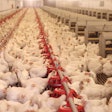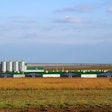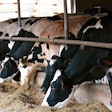The repercussions of the dioxin contamination that emerged in Germany in December last year will have far greater consequences than a simple dip in consumer confidence, as stricter regulations governing feed fats are being discussed by both the German authorities and EU officials.
The incident started with the mixing of fatty acids, meant to be used for technical purposes (such as paper processing), with vegetable feed fat, used in the production of compound feed. The fatty acids were contaminated with dioxins.
Unfolding story
The German authorities initially believed that one 26 tonne consignment of contaminated fatty acids from industrial fats and feed company Harles and Jentzsch had been mixed with 500 tonnes of vegetable feed fat. The consignment originated in a biodiesel company and was delivered to the feed fat producer, where mixing occurred. The contaminated fat was then delivered to nine feed manufacturers, and the compound feed produced from the contaminated fat was delivered to some 40 farms.
However, in early January, the German authorities discovered that six other consignments of fatty acids from the biodiesel company were delivered to the feed fat producer. As a precaution, they decided to consider all fat produced at the feed fat manufacturer since November 11th 2010 as potentially contaminated. The fat had been delivered to 25 compound feed manufacturers across Germany and was mixed into compound feed for laying hens, broilers, cattle and pigs.
Initial investigations found that more than 1,000 farms received the compound feed containing potentially-contaminated fat, and the German authorities imposed restrictions on all affected farms. Tests on eggs and poultry meat from these farms showed increased dioxin levels, in some cases four times higher than the permitted EU. However, subsequently, it was found that some 4,800 agricultural holding were listed as possible customers of the potentially-contaminated compound feed and all were immediately blocked. By mid-to-late January, over 930 agricultural holdings remained under restriction.
Despite recalls, a total of 136,00 potentially contaminated eggs were delivered to the Netherlands to produce egg products. Some of these products were then sent to the UK. Critical dioxin levels in pork were found at two holdings.
Higher German standards
Germany has announced that it will enforce higher standards in animal feed production, and some measures have already been approved. They will include a new licensing system for producers of oils and fats intended for use in animal feed and a mandatory separation of oils and fats for use in industrial and animal feed.
Animal feed producers will be required to test their ingredients themselves and provide all test results to the authorities, while an early warning system will also be created for dioxins.
Germany’s Federal Ministry for Food, Agriculture and Consumer Protection has said that companies that produce, treat or market fats or fatty acids for feed from fats, oils or fatty acids will be subject to a duty to obtain authorization. This means that every company will have to be inspected on-site by the competent authority prior to commencing operations.
To meet the requirements for authorization, fats and fatty acids will have to be regularly tested to ascertain levels of undesired substances. Results will have to be documented, reported to competent authorities and kept for at least two years. Retained samples will have to be kept for one year.
Fats and fatty acids for feed may no longer be manufactured in facilities that produce substances for the technical industry.
Fats and fatty acids for feed should be stored separately from substances that are not food or feed. Institutions in which fats and fatty acids for feed are stored should not be permitted to be connected, via pipes or ducts, with storage facilities that are used solely to manufacture food or feed. The same should apply to transportation.
In first publishing its proposals, the Ministry noted that it would advocate the introduction of such standards Europe-wide.
Additionally, the Ministry has proposed drawing up a positive list of feedstuffs. This would be an exhaustive list of feed materials that are permitted to be processed into compound feedstuffs. It added that it would only be possible to introduce a compulsory list such as this at EU level.
Such a list would improve safety and transparency in the market and should ensure that only feed materials tested by independent experts are included; that the designations laid down for labeling the respective feed materials are binding; that manufacturing methods and raw materials and aids used for manufacture are clearly described; and that it is only permitted to use feed materials that are on the positive list.
EU response
Member of the European Commission responsible for Health and Consumer Policy John Dalli commented that the incident had highlighted the necessity of ensuring the effectiveness of national control systems.
Speaking at an Agriculture Council meeting in late January, Dalli underlined that the EU traceability system had worked, and that the European Commission Services had kept in constant contact with the German authorities and disseminated immediately all information to the Member States through the Rapid Alert System for Food and Feed.
He announced, however, that the Commission was preparing to present the following four concrete measures for debate and vote in the Standing Committee on the Food Chain and Animal Health.
The compulsory approval of establishments manufacturing, treating and marketing fats and fatty acids will be a reasonable measure to gain more control over such activities.
The suggested separation of production streams will be examined very thoroughly. In this respect, two questions will have to be answered: First, should we require that products for feed have to be manufactured, stored and transported in specially dedicated plants and transporters? And second, should we strive for a system assuring the proper segregation of feed from products for technical use? This latter issue could be achieved more easily by measures concerning technical equipment, colouring or labeling.
With respect to dioxin monitoring, a strict plan for sampling and analysis for critical materials in fat producing plants will be established. It may also be appropriate to cover other activities in the feed chain by increased monitoring. A dioxin database, or instance, is already established within European Food Safety Authority, and making better use of this as a tool should be explored in future.
The extension to private laboratories of reporting obligations of positive findings is something that could also be included in a potential package of reinforced dioxin monitoring.
However, he was not in agreement about all the measures in the German action plan and commented that, on a legally binding positive list of feed materials, he was still to be convinced. The contamination incidents of the past teach us that such lists are not an effective means to prevent incidents from occurring, just because the feed in question was listed, he noted.
Concerning the German suggestion of a mandatory insurance of feed businesses for liability risks, the Commission issued a report in 2008 which concluded that no such obligation should be imposed in EU law. However, the Agriculture Council will look at this matter once more in the light of recent events to assess effectiveness and feasibility.













